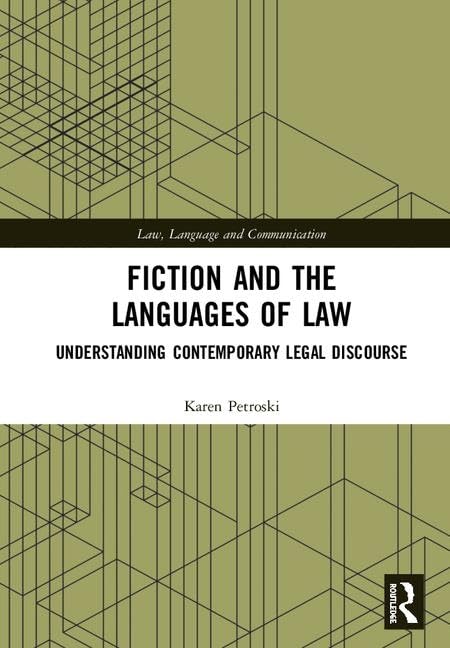Fiction and the Languages of Law: Understanding Contemporary Legal Discourse (Law, Language and Communication)
Fiction and the Languages of Law: Understanding Contemporary Legal Discourse (Law, Language and Communication) is backordered and will ship as soon as it is back in stock.
Couldn't load pickup availability
Genuine Products Guarantee
Genuine Products Guarantee
We guarantee 100% genuine products, and if proven otherwise, we will compensate you with 10 times the product's cost.
Delivery and Shipping
Delivery and Shipping
Products are generally ready for dispatch within 1 day and typically reach you in 3 to 5 days.
Book Details
-
Publisher: Routledge
-
Author: Karen Petroski
-
Language: English
-
Edition: 1st Edition
-
ISBN: 9780815350118
-
Pages: 240
-
Cover: Hardcover
-
Dimensions: 9.8 x 7.1 x 0.7 inches
About The Book
Fiction and the Languages of Law by Karen Petroski explores the fascinating intersection between legal reasoning and fictional discourse. Through a close examination of the U.S. Supreme Court’s decisions during the October 2014 to June 2015 term, Petroski highlights the surprising similarities in the way legal language is used and the way stories are told in fiction. By focusing on the linguistic and rhetorical patterns in judicial opinions, the book offers a fresh perspective on contemporary American legal reasoning. It invites non-lawyers to explore the complexities of legal language while also providing legal readers with new insights into their own writing habits.
The book discusses a wide range of cases, from the rights of drivers stopped by police to decisions made by the Environmental Protection Agency, culminating in the landmark case recognizing the constitutional right to marriage for both same-sex and different-sex couples. Petroski reframes ongoing legal debates and uncovers paradoxes within legal discourse, tracing these issues to judges' and lawyers' unconscious shifts between two attitudes toward language and professional biases that prevent thorough self-scrutiny. Fiction and the Languages of Law offers a thought-provoking look at the power of language in law and its profound connection to narrative storytelling.





